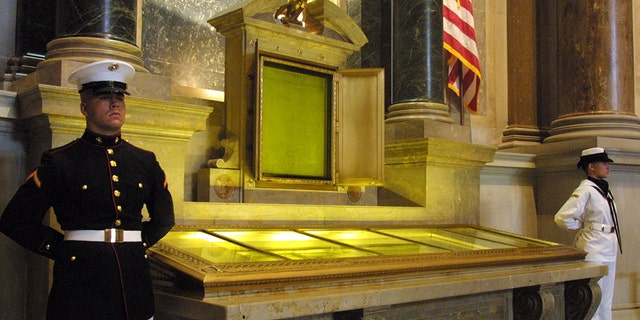Reporter's Notebook: The Electoral Count Act, and how Congress may transform it

Fox News Flash top headlines for January 12
Fox News Flash top headlines are here. Check out what’s clicking on Foxnews.com.
There’s an old saw about a butterfly flapping its wings in Brazil – and consequentially spawning a tornado in Texas.
One could argue there’s an equivalent of the “Butterfly Effect” in American politics. Consider the fact that Oregon, South Carolina, Florida and Louisiana sent disputed Electoral College ballots to Washington in the presidential election of 1876. Those controversial ballots from 1876 may have helped spark a riot at the Capitol 144 years later.
The 1876 tilt between eventual President Rutherford B. Hayes and Samuel Tilden is one for the ages. It also revealed just how frail the U.S. electoral system really is when the sides can’t agree on who won the presidency and why.
HOUSE REPUBLICAN LEADER KEVIN MCCARTHY HAULS IN A RECORD $72M LAST YEAR
Circa 1875: Rutherford B Hayes (1822-1893), 19th president of the United States
(Stock Montage/Stock Montage/Getty Images)
Tilden captured the popular vote in 1876. He bested Hayes by three whole percentage points and 252,000 ballots out of 4.4 million votes cast. But the aforementioned issues with electors from Oregon, South Carolina, Florida and Louisiana spurred Congress to create a commission to settle who actually captured the White House before inauguration day on March 4, 1877. The commission awarded the presidency to Hayes. The panel finally determined that Hayes scored one more electoral vote than Tilden.
One of the more intriguing tales of the election of 1876 stems from Colorado and its three electoral votes. Colorado joined the union in the summer of 1876. The state lacked the wherewithal to conduct a presidential election. So the new Colorado state legislature awarded the Centennial State’s three electoral votes to Hayes – without ever hearing directly from the voters.
And never mind that Congress ultimately declared Hayes the victor by a sole electoral vote.
Congress understood the calamity that unfolded in 1876. But it took until 1887 to seal up some of the issues with how to settle a disagreement in the Electoral College. Congress approved the Electoral Count Act (ECA) that year to dictate a specific process for lawmakers to certify the electoral votes sent to Washington by the states.
That’s why the House and Senate convene a Joint Session of Congress every four years to adjudicate each state’s slate of electors. The vice president serves as president of the Senate and presides over this particular Joint Session.
The law dictates that there must be a petitioner from the House and Senate to challenge any state’s electoral votes. If that’s the case, the House and Senate break off to debate each state for two hours and then vote to accept or reject those electoral votes.
Embedded in the ECA is a “safe harbor” provision. States must resolve their own questions about electoral votes in early to mid-December and send an official slate of electors to Washington for Congress to certify during the Joint Session of Congress.
The problem with the ECA is that there are competing views as to how much latitude the vice president has during the Joint Session to disregard a state’s electoral votes and potentially freelance. There is increasing chatter on Capitol Hill about trying to mend possible loopholes in the law to prevent mayhem on future January 6ths. It’s unclear if Congress could – or would – move before Jan. 6, 2025. Remember that it took 11 years for Congress to get its act together after the 1876 Hayes/Tilden debacle.
“It’s vague and ambiguous and contributed to some of the confusion on Jan. 6,” said Sen. Susan Collins, R-Maine, about the ECA.
Those loyal to former President Trump trained their attention last year on then-Vice President Mike Pence when Congress met to certify President Biden’s 2020 win. Trump implored Pence to intervene. Pence resisted.
Former Vice President Mike Pence pauses while speaking during the Republican Jewish Coalition (RJC) Annual Leadership Meeting in Las Vegas, Nevada, on Nov. 6, 2021.
(Bridget Bennett/Bloomberg via Getty Images)
“But what if he had or what if a future vice president decided to play political games with the Electoral Count Act?” asked Collins.
Rep. Louie Gohmert, R-Texas, filed a federal lawsuit in late 2020 specifically to empower Pence to exercise his “discretion” over Electoral College votes. But the suit never went anywhere.
Pence sought the counsel of Dan Quayle, the former vice president and Indiana senator and congressman, leading up to last Jan. 6. As vice president in early 1993, Quayle presided over a similar Joint Session to certify the election of President Clinton over President George H.W. Bush and Ross Perot. In their book “Peril,” authors Bob Woodward and Robert Costa write that Quayle advised Pence that he had “no flexibility” when it comes to intervening in the certification of the Electoral College.
The Constitution prescribes that during the Joint Session of Congress, the vice president “shall, in the Presence of the Senate and the House of Representatives, open all the certificates and the Votes shall then be counted.”
An honor guard stands next to the original copies of the Declaration of Independence, the Constitution and the Bill of Rights on July 4, 2001, at the National Archives in Washington.
(Alex Wong/Getty Images)
Frankly, the role of the vice president is up for debate, regardless of what Quayle told Pence – and what Pence did or didn’t do. There is actually a historical precedent for the vice president to interject himself into the proceedings.
Such was the case in 1961. Vice President Richard Nixon presided over a Joint Session that certified his own defeat as the GOP presidential nominee to President John F. Kennedy. The election of 1960 was Hawaii’s first presidential election, having joined the union in 1959. Hawaii didn’t pull “a Colorado,” ala 1876. But it did send in an initial, incorrect slate of electoral votes in favor of Nixon. However, after a recount, Hawaii’s electoral votes revealed Kennedy as the winner.
Scholars argue that technically, Nixon should have awarded the initial slate of Hawaii electors to himself. But, in what may have been a magnanimous gesture, simply because Kennedy prevailed in the overall election, Nixon presented the Aloha State’s three electoral votes to the senator from Massachusetts.
However, the Hawaii example raises a key question and exposes the major flaw in the Electoral Count Act.
“What does Congress do with two different documents from Georgia, for example, or Arizona, if they say they (represent) the electoral votes from the state?” asked constitutional law professor Ed Foley at Ohio State University. “Congress has to make a decision on which of those two documents is the correct document.”
And that’s why lawmakers on both sides express concern about the powers of the referee during the Joint Session: the vice president.
CLICK HERE TO GET THE FOX NEWS APP
Don’t expect anything to happen on the Electoral Count Act right away – even though some Republicans suggest the law is worthy of examination before the next presidential election. Remember, it took Congress 11 years to create the Electoral Count Act after the chaos of 1876.
So, maybe Congress can update the statute in 2031 – just in time for the 2032 presidential election.
Source: Read Full Article




